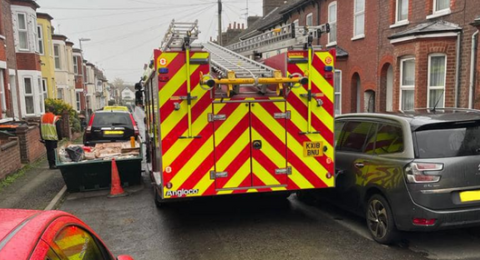Emergency Vehicle Awareness
Help Blue light vehicles respond to emergencies as quickly as possible. Do you know what to do if a Blue Light vehicle needs to pass? Make sure you park considerately so our appliances can attend incidents and access hydrants quickly.

Keep calm, look and listen...
Where is the emergency vehicle coming from? Is it behind you or approaching from a side road? Turn off your radio or music so you can work out where the noise and light are coming from.
When you hear sirens and see flashing lights:
1. Check your mirrors
Look to see if it's giving any signals that might tell you where it wants to go.
2. Slow down gently
Don’t break suddenly. drivers behind you might not react the same way as you do.
3. Pull over and stop if there is a safe place to do so.
- Don’t forget to indicate what you are doing. But don’t pull up onto kerbs, pavements or soft verges.
- If you stop ensure there’s enough space for a fire engine or similar vehicle to pass you, otherwise you’re just blocking the road.
- On a bend or brow of a hill or if there are solid white lines in the middle of the road keep going until you can pull over at a place with better visibility so the emergency vehicle can pass you.
- Don’t enter bus lanes or block yellow hatched areas.
4. Once all the emergency vehicles have passed you can continue your journey
But be cautious, they may have been on their way to an incident like a road traffic collision that’s just ahead. Follow at a safe distance.
While emergency vehicles can go through red lights you shouldn’t. Stay safe behind the white lines, move over if you can but don’t put yourself in danger or break the law.
Parking safely
When attending a fire or road traffic collision, every second is precious. How would you feel if fire fighters struggled to reach your home, or the home of your family or friends in an emergency situation? Our smallest appliance needs a minimum of 3m (around 10ft), or the width of two cars, to pass down a road safely

Fire Hydrants
In the event of fire, it is vital that firefighters have access to water supplies quickly. Obstruction of fire hydrants, particularly inconsiderate parking could place the lives of you, your family and your neighbours at risk. A person commits an offence if they damage or obstruct a fire hydrant and is liable on summary conviction to a fine not exceeding £500 (Fire and Rescue Services Act Section 42).

